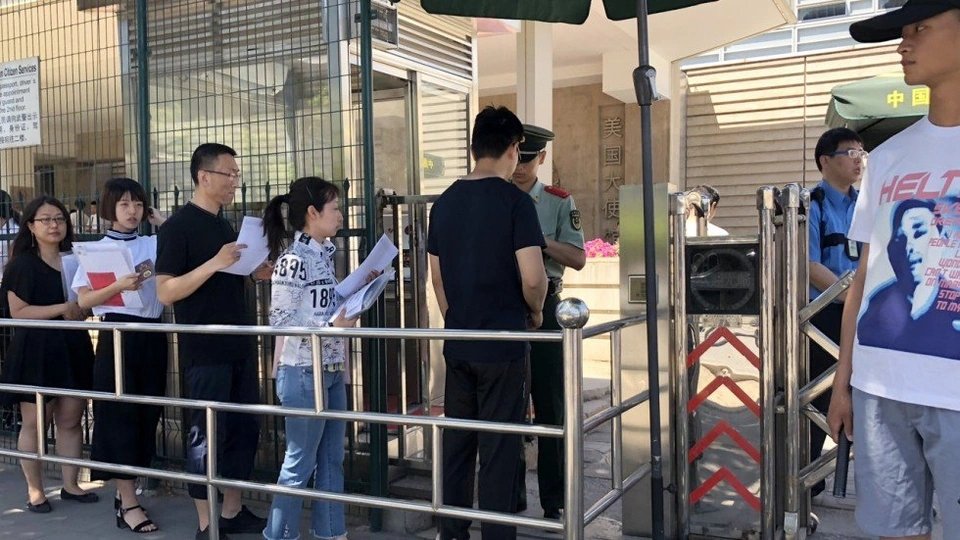(Dan Tri) – In the context of escalating US-China trade tensions and Washington’s concerns about Beijing’s violation of intellectual property rights, graduate students in China’s high-tech industries are having a hard time.
A line of people lined up in front of the Chinese embassy gate in Beijing (Photo: SCMP)
When Sonia Sun returned to China at the end of May to reapply for a US visa for the engineering doctoral program she was studying, Sun encountered many obstacles.
Last year, the 29-year-old graduate student at Purdue University in West Lafayette, Indiana, had to travel all the way to Guangzhou and wait six weeks to get his J-1 visa, a non-immigrant visa issued by the United States.
During a half-hour interview with consulate staff, Sun was asked a lot about her research field and why she chose the US as a place for higher education.
This is in stark contrast to 2016, when Sun easily received a visa after just 2 weeks of submitting the application.
Sun felt very worried within 2 months after she submitted her application and explained specifically why she chose to study the telecommunications industry.
“I’m not just concerned about visas.
Sun is one of many Chinese graduate students subject to the US tightening the visa verification process in the context of US-China trade tensions that are escalating every day.
Tighten policies
From July 11, Chinese doctoral students studying in the US in fields such as aviation, automation, robotics, and high-tech engineering will only be granted visas for a maximum of 1 year.
According to AP, the above measure is intended to protect intellectual property rights for US products while China is accelerating its `Made in China 2025` policy.
Therefore, the US has taken a number of measures to prevent the prospect of China being able to own Washington’s patents and intellectual property for Beijing’s purposes.
Since taking office early last year, US President Donald Trump has expressed a tough stance on immigration, fearing threats to national security.
One of the reasons for the decline is because students are concerned that Mr. Trump’s immigration program will affect their ability to receive H1-B visas after graduation.
In its national security strategy report in February, the US affirmed that it would consider restricting the issuance of visas to STEM students from a number of countries to ensure that intellectual property rights would not fall into the wrong hands.
Of the 362,000 Chinese people who went to the US to study abroad in 2017, 42% of them studied STEM fields, according to data from the US Department of Homeland Security.
There are no exact figures on the number of Chinese scholars affected by America’s tightening policies, but Beijing’s science and technology students and graduate students appear to be the most affected.
A Chinese telecommunications professor surnamed Wang said his colleague at a leading Chinese university was denied a visa by the US to go to Honolunu, Hawaii to participate in a technology conference.
Lord Emperor
According to SCMP
